What Avesco has planned for key rental markets
28 February 2022
Vincent Albasini, CEO of Avesco Rent, talks to Murray Pollok about the recovery of the Swiss rental market and the company’s plans for the Baltic States and Finland.
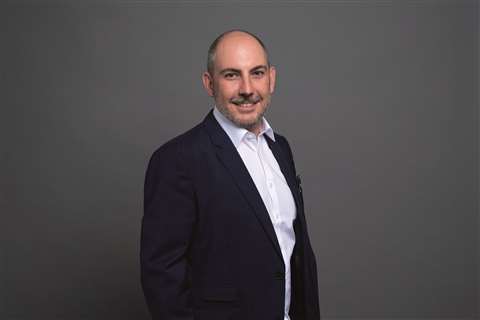 Vincent Albasini, CEO of Avesco Rent
Vincent Albasini, CEO of Avesco Rent
IRN: Looking at the rental business in Switzerland, how difficult a year did you have in 2021?
Vincent Albasini, Avesco Rent: For rental in the construction segment, during the first wave, I think the French part of Switzerland was impacted, the German part had no impact, and in some areas we grew.
So, we were a little behind 2019, but not a real impact when we compare with France or Italy, for example. The main impact for Avesco was events, because it’s a big part of our business [normally around 10 to 15% of the total]. In 2000 events were down 85% or 90%, so that was the main impact.
But in 2021, even the events sector did not really rebound - I think it’s around 20, 25% compared to the past. We already invested a lot in different sectors. For example, we developed a lot on containers, for example, for mobile buildings.
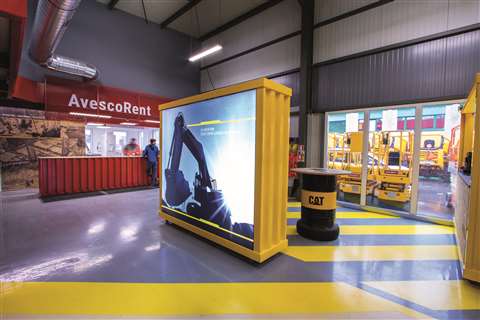 The internal view of one of Avesco’s locations in Switzerland.
The internal view of one of Avesco’s locations in Switzerland.
We can build a temporary school, for example. We compensated for the reduction in events already in 2021. We recovered the 2019 volume of turnover, and a little bit more.
Portable accommodation was previously a very small activity because in Switzerland we have two main players, Containex and Condecta.
During the crisis, we decided to develop this activity a little bit more. And the demand was huge. And now it has a big role: we doubled the accommodation turnover between 2020 and 2021.
IRN: How important is the Caterpillar equipment to your business?
VA: It’s a big part of the business. But at the same time, it’s really amazing when we grow with a new product, for example containers, at the same time we are growing on the Cat equipment.
Finally, we see a balance. We can say that over the last five or six years, the Cat equipment part has been almost the same proportion. And it is interesting: maybe we are more visible with the containers - we are the first ones on the job site - so that helps to keep more deals.
IRN: What about the FastRent experience – the all-digital business. What has happened?
VA: At the beginning for Fast Rent the idea was a separate business with a new brand to be more flexible, to use a full digital approach, with dynamic pricing. So from 2014 to 2019 it was like a startup. We tested a lot and in 2019 we decided we can use the platform. So we have transferred it to the Avesco Rents network.
And now we are using Fast Rent for our work in the do it yourself (DIY) sector, where we have the partnership with Hornbach, like Boels and like Kiloutou in France. We are using Fast Rent in Switzerland for that and as a brand it is only used in the DIY stores.
But the ideas from Fast Rent are now being used by Avesco in Switzerland already, but not in all of the network. We want to move during 2022 to propose a full digital experience for part of the product.
In the Baltics we are already using this approach. We are present in three countries [Estonia, Latvia and Lithuania] with seven branches and we are using the same approach. And now we are thinking about that for Finland.
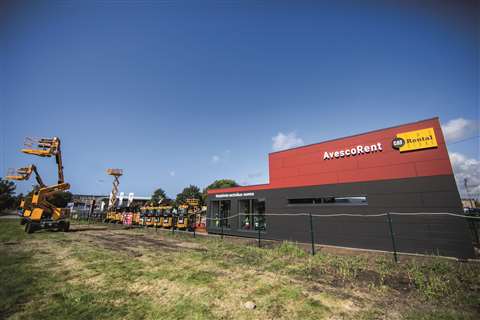 This location in Klaipėda, a port city in Lithuania, is one of seven it now has in the three Baltic States.
This location in Klaipėda, a port city in Lithuania, is one of seven it now has in the three Baltic States.
The Fast Rent approach is not available in all regions in Switzerland, but the goal for the end of 2022 is to have both channels available.
We will have two channels: the traditional channel with sales people and a coordinator to manage the request from the customer and to organise the contract.
And the second channel is the digital channel, where the customer is able to book the machines and pay online, and see the availability of equipment. That will be available for the whole of Switzerland at the end of 2022.
IRN: A customer can use dynamic pricing models with Avesco or he can go down the traditional route with a salesperson?
VA: The customer has several propositions. First, as normal, he can have a fixed price so we can sign a framework agreement connected with an account. The system applies directly the fixed price.
A second proposition is, OK, sometimes he wants to negotiate with the sales team, for example, or when he really wants to use the dynamic pricing, he can book the machines. It’s two different ways.
We have some customers who are not interested in signing a framework agreement. They prefer to see the opportunity on dynamic pricing, because they know that the price changes a little bit. To be honest, that’s more for the small and middle-sized customers, because they are very flexible.
For key accounts, it’s not possible to have dynamic pricing. But it’s not a problem because they have their own price condition and they are able to go with the account and book machines.
IRN: And how much business is going through the digital channel now?
VA: In Switzerland it is very modest at the moment, but in the Baltics we can say 25 to 30% of contracts are made online.
And it interesting because in the Baltic States, we created the company between 2018 and 2019 and we were really the first with the full digital approach. I think it depends really on the culture and habits of the country.
And when you look at the Finland, I think it’s the same.
IRN: What is the potential for the Hornbach DIY stores?
VA: There are eight stores and we are in all of them. We follow the strategy of Hornbach. And in some regions we are looking maybe to have different partners. At the moment the focus is with Hornbach.
IRN: And you are also looking at a franchise model to expand in some areas of Switzerland? One example is the arrangement with Waelti SA in Neuchâtel.
VA: The approach is to have some partners in small regions where it is complicated to open a new branch because the volume of turnover is not enough for us.
It’s a little bit different from franchising, because it is our equipment and we outsource the operation to external partners. They manage the equipment, they do the contract, and they are in touch with the customer and with our platform.
IRN: Going back to the Baltics. The ERA values the market at €200 million annually: do you see it as a good opportunity?
VA: First we had the dealership, so we are trading all the Cat equipment and different brands for the job sites. And for rental it’s a very interesting market, with a lot of opportunity for the future, with the big Rail Baltica project supported by the EU in the three countries.
We have opened seven branches over the last three years and we have a greenfield approach.
We are not the main player - the leader of the market is really between Ramirent, Cramo and Storent – but we are following our strategy and we want really to be one of the main actors.
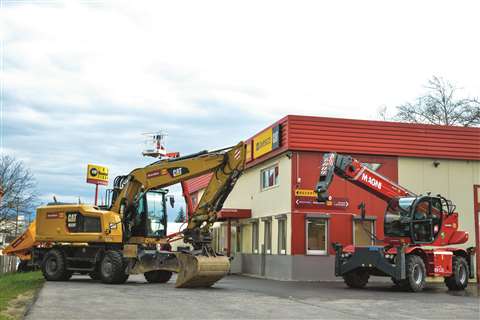 Caterpillar equipment is an important element of Avesco Rent’s business.
Caterpillar equipment is an important element of Avesco Rent’s business.
They are not huge countries and they are very concentrated in the cities, so we need to be strong in the main cities.
It’s a little bit different from Switzerland because it’s much more dynamic. I think we want to see double digit growth for the coming years.
In the Baltic States we are much more concentrated on the construction equipment. We are strong in Cat equipment as well as power and temperature control.
There is a smaller range of products: the number of product types in Switzerland is 300 and in the Baltic States we are between 80 and 100.
IRN: And what about Finland?
VA: In Finland now we are really working, but I think the Covid situation will delay our project a little bit, but we are really ready to launch our strategy. We will open a little bit [this] year, so we are working now to transfer our knowledge to be present.
Finland is really a huge market for rental - the volume of turnover is double Switzerland - so if we can take a little part of the market, I think that will already be a success.
IRN: Growth through acquisitions or organic?
VA: We are looking at both. We are in touch with some players and at the same time, we are looking at the greenfield.
Sometimes I think greenfield is not a bad approach, when you consider the investment needed to acquire a business, sometimes with very high goodwill.
IRN: How ambitious are you for that market?
VA: To be honest, when we look at the Finnish players, they are really strong. But I think we have some advantages in some product categories - not to be the in first place, but to be in the top 10 in the next five years.
I think for us, we cover five different countries. We see really a rental group. Our ambition is not to be the first in every country like in Switzerland - because we are strong market leader there - but to be one of the main rental players in Europe. I think this is a really interesting time for our group.
How Avesco Rent is reducing transport emissions
Avesco Rents is reducing its transport emissions through a joint venture with transport specialist Friderici Spécial, using an electric 40 tonne truck developed by Swiss company Designwerk.
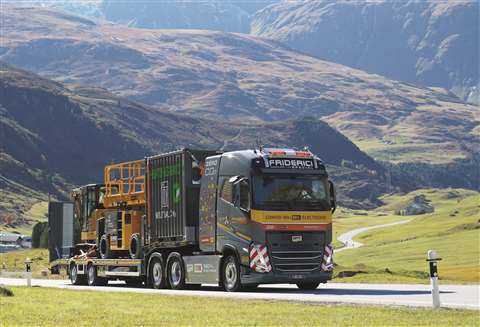 The 40 tonne electric truck being used for intra-network fleet transport.
The 40 tonne electric truck being used for intra-network fleet transport.
The truck, which has 22 tonne carrying capacity and is based on a Volvo vehicle, is being used for the transport of machines between Avesco’s branches in Switzerland.
Vincent Albasini, CEO of Acesco Rents, tells IRN that the project will allow it to quickly reduce it carbon emissions; “We undertook a real deep analysis of our footprint in events and realised that 45 to 50% of our emissions come from transport. We extended the analysis into a lot of applications, and saw that it really is between 45 and 50%.
“It’s internal transport, not from the branch to the job site. This represents around 8% to 10% of our total carbon footprint for transport. It’s really a good option because it’s a first step, and not for 1% or 2%, but 10%.”
He says the lower road tax and maintenance costs means that the higher costs of the truck will be paid for within four years.
“Before this analysis, we focused on having a new generation of [low emission rental] equipment, but not on transport. Today, we continue to focus on the equipment, but transport is 45 to 50% of emissions. It’s really huge.”
Read the full interview on the carbon reduction strategy here.
STAY CONNECTED



Receive the information you need when you need it through our world-leading magazines, newsletters and daily briefings.
CONNECT WITH THE TEAM








